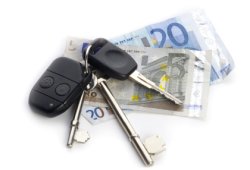Car Financing Costs

Keeping car finance costs down
The first and most important cost is the car price and the associated car financing costs.
Use our calculator to estimate the monthly repayments associated with your car finance agreement.
Generally car finance or car loan agreements are either in the form of consumer hire purchase agreements or personal loans. The cost under either option is usually similar or perhaps slightly dearer if opting for a personal loan. The reason for the personal loan being dearer is that the lender does not take security on the vehicle which is the case in a consumer hire purchase transaction. The real benefit of personal loans as a form of finance is their flexibility in that lumps sums can be paid off the loan during the agreement subject to certain conditions.
As always the single most important fact is your comfort with the car finance repayments. The last thing you need is to feel under pressure in meeting your repayments. Use our budget tool to satisfy yourself in this regard and don't forget you don't have to buy a new car to get from a to b!
Depreciation
The rate at which your car devalues is a true motoring cost. It does not seem that important at the outset but it certainly clicks in when you go to trade in your car in three years time.
There is information throughout the web on depreciation rates but a little homework or asking around will give you a good feel for depreciation rates. So when comparing the prices of two cars it is important to estimate what they will both be worth in three years time.
Insurance
No matter which car you buy, the law requires you to insure it. The cost of your insurance will depend on the car you buy, your age, occupation and driving record, your anticipated annual mileage, and whether or not you use the car for business, as well as pleasure. You will pay more for your insurance if you live in a city or large town, where there is a greater chance of your car being involved in an accident, being vandalised or stolen, than if you live in a quiet, rural area.
Insurance companies reward drivers with a "no claims bonus" if they do not make claims. These bonuses are simply discounts on the premiums charged and typically range from 25% for one year without making a claim to 60% or even 65% for five claim-free years. However you should note that significant variations are likely between Insurance companies in this regard.
At Carfinance.ie you have a superb opportunity to avail of our group referral scheme arranged by Glennons , ONE OF Ireland's largest independent Insurance Intermediaries.
Types of policy
There are two main types of motor insurance policy: 'comprehensive' and 'third party, fire and theft'.
- Comprehensive insurance covers all the risks of 'third party, fire and theft' plus the costs of repairing any accidental damage to your own car and reimbursing any medical expenses for you and your passengers incurred as the result of an accident in your car. The insurance will also pay out a specified amount in the event of your death or disablement while driving the car, and insure certain personal effects in your car against loss or damage.
- Third party, fire and theft insurance only covers the bare minimum. It will pay out your liability for any injuries caused to other people, including passengers in your car; it also covers the liability of your passengers for any accidents that they may cause. In addition, it pays out for any damage caused by your car to other people's cars and property, and recompenses you, if your car is stolen or destroyed by fire. Saving money on insurance
There are a number of ways in which you can save money on your car insurance premiums:
- Buy a car with high safety features. Some insurance companies charge significantly lower premiums for cars with a good safety record.
- Increase your excess. Most insurance policies will expect you to pay a specified amount (typically €125 or €250) towards the cost of meeting each claim. This is called an 'excess' and, if you agree to pay a higher amount towards each claim, you can reduce your premiums considerably.
- If you are older, look at specialist insurers. Some insurance companies have found that older drivers spend less time on the road and are more careful drivers when they do go out. As a result, they offer lower premiums to people who are over age 50.
- You should shop around, to get the most competitive quotation. Servicing and spare parts
Unfortunately, things do go wrong with cars. As a result, we need to have them serviced regularly, to make sure that any potential problems are picked up and eradicated before they become too serious.
The spare parts for some cars, particularly 'executive' and luxury vehicles can be very expensive. Even tyres and exhausts can cost much more than you might think. So, before finally choosing a model, it would be worthwhile asking the dealer how much some typical parts would currently cost. For an average car, you should allow around €750 a year for servicing and parts.
Road tax
The cost of this tax depends on the engine size of the car. So, don't forget to build this into your budget.You can review motor taxation rates at the Revenue website www.revenue.ie
Fuel
You should consider carefully how economical or expensive your chosen vehicle is likely to be. An average car, doing 30 miles to the gallon and being driven for 10,000 miles a year, will currently cost approx. €1,750 a year in petrol. However, with larger and high performance cars the petrol costs are likely to be considerably higher.
The information provided in this guide does not constitute tax, legal, investment or any other advice.